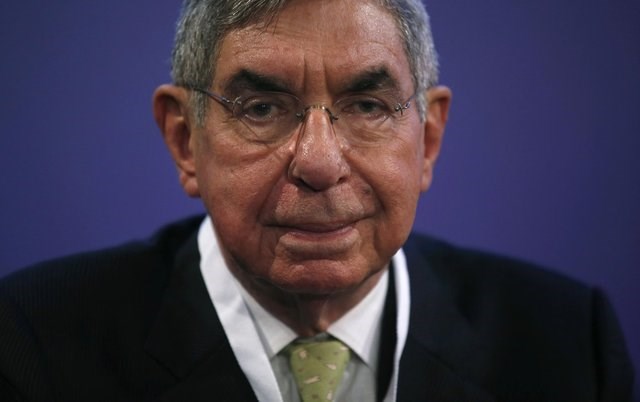
FILE - Nobel Peace Prize laureate and two-time Costa Rican President Oscar Arias looks at the media during the opening ceremony of the XV World Summit of Nobel Peace Laureates at the University in Barcelona, Spain, Nov. 13, 2015. (AP Photo/Manu Fernandez, File)
April 02, 2025 - 7:47 PM
SAN JOSÉ, Costa Rica (AP) — Former Costa Rica President and Nobel Peace Prize winner Oscar Arias says the U.S. government’s unexplained cancelation of his visa won’t stop his public criticism.
Arias, 84, told the AP Wednesday that he received an email from the U.S. State Department on Tuesday, notifying him of the decision. The brief email said that the decision “is based on the fact that subsequent to visa issuance, information has come to light that you may be ineligible for your visa.”
It said that if Arias wanted to travel to the U.S. he would have to re-apply. The U.S. State Department did not explain the decision.
He spoke shortly after U.S. President Donald Trump announced a wave of tariffs against dozens of its trading partners around the world, including a 10% duty on imports from Costa Rica.
It made no sense coming from the country that pushed free trade around the world and signed dozens of free-trade treaties, Arias said.
“History proves it. You can empirically analyze that those countries with more open economies and more free trade are the ones that have grown more and have been able to improve in little time,” he said. Arias was the biggest promoter of the free trade agreement that the U.S. signed with Central America.
Arias says he doesn’t know why his visa was revoked, but acknowledged that Washington may not have liked his comments on the war in Ukraine, the U.S. commercial conflict with China or the situation in Gaza.
“Another of the big issues has been disarmament, spending less on weapons and soldiers to free up resources,” he said. “To give them to education, healthcare and protecting the environment and so many other priorities there are in the world to benefit humankind.”
The decision to dismantle the U.S. Agency for International Development, which addressed basic human needs around the world, confounds Arias.
“What it all shows is that the priorities are all mistaken and the priorities are all mistaken because the ethical values are mistaken,” Arias said.
Arias said he isn’t losing sleep over the decision.
“The United States already gave me 93 honorary degrees,” he said. “They aren’t going to give me any more. The main reason for my trips (to the U.S.) was to receive those doctorates. I would have preferred this didn’t happen because I admire that country, I admire it’s people.”
News from © The Associated Press, 2025